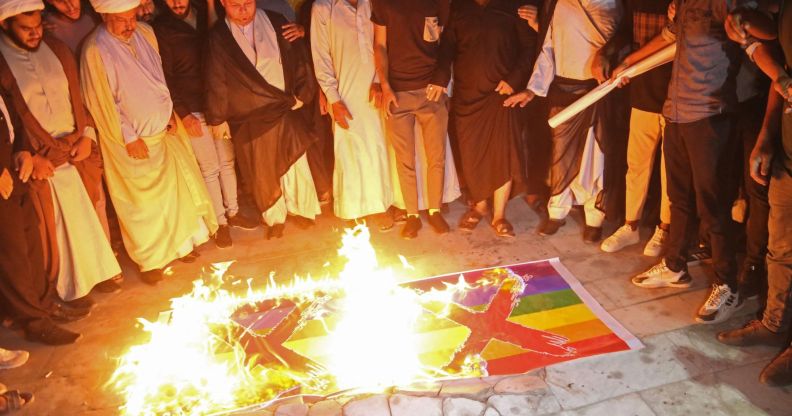Iraq to ban the words ‘homosexual’ and ‘gender’

Homophobic protestors in Iraq burn two Pride flags with X’s drawn on them. (Getty)
Iraq is ordering its media platforms not to use the words “homosexual” or “gender”.
Iraq’s Media and Communications Commission (CMC) issued new directives to media and social media platforms, ordering them to stop using “homosexuality” when discussing LGBTQ+ people and to instead speak only of “sexual deviancy”.
The CMC is also to ban the word “gender”, and prohibit all phone and internet companies licensed in the country from using it.
Officials claimed that the move was intended to safeguard so-called societal values and to supposedly maintain public order.
No specific penalties for violating the planned policy have been published as yet but it is expected that punishments could include a fine.
While Iraq does not explicitly ban homosexuality, public perception and morality clauses in its penal code mean that LGBTQ+ people are routinely targeted domestically and institutionally.
A bill banning homosexuality was submitted to parliament last month by the deputy head of the committee on legal affairs, Mortada Al-Saadi, who called on Council of Representatives speaker Mohammed al-Halbousi to put it on the agenda during the legislative session that begins in September.
Anti-LGBTQ+ hate has been rising in the region since the beginning of the year with another bill published by the Kurdistan regional government in Iraq that, if passed, would punish LGBTQ+ advocacy by up to one year in prison and a fine of five million dinars (£3,000).
In addition, Rasan – the only human rights group in Kurdistan advocating for LGBTQ+ equality – was banned for “activities in the field of homosexuality” in May, according to the Human Rights Watch.
According to LGBTQ+ community advocacy group Equaldex’s Equality Index, which ranks countries based on queer equality, Iraq flounders 176th out of 197.
Data collected last year suggests that just two per cent of the population support homosexuality, while 55 per cent oppose it. The remainder refused to answer or claimed not to know.

